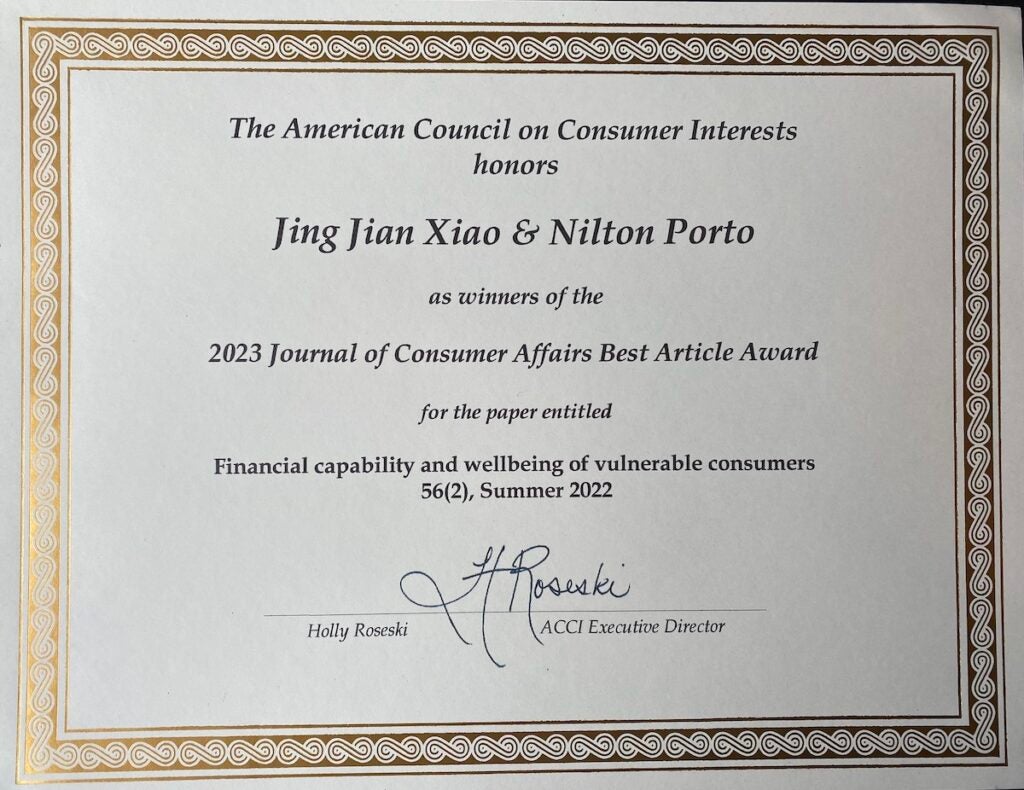URI professors Jing Jian Xiao and Nilton Porto win ‘Best Paper’ award in leading consumer science journal
Consumers with high financial capability are more likely to achieve economic success and financial well-being in their lives. But how consumers attain that capability is a question on which researchers and financial educators have differed.
It is the subject of an award-winning paper by two University of Rhode Island professors, who have determined that personal behavior is the most important factor, no matter how much skill and knowledge consumers have.
Human Development and Family Sciences Professors Jing Jian Xiao and Nilton Porto won a “Best Paper” award for their article published in the Journal of Consumer Affairs, the leading publication in the field of consumer science. Their paper, “Financial capability and wellbeing of vulnerable consumers,” details the professors’ findings that financial behavior is the most important factor that determines a consumer’s financial wellbeing, trumping financial knowledge and financial skill.
“Results suggest that for low-income consumers, encouraging them to engage in desirable financial behaviors is more important than teaching them financial knowledge and skills,” Xiao and Porto write. “Findings have implications for financial educators, practitioners and policymakers to help them recognize the proper financial education or program to be delivered based on consumer vulnerability and components of financial capability.”
The researchers examined data from the National Financial Well-Being Survey, conducted in 2016 by the Consumer Financial Protection Bureau, which analyzed the three financial capability components to financial wellbeing: skill, knowledge and behavior. The findings suggest that for most people, financial behavior contributes the most, financial skill contributes the second most, and financial knowledge contributes the least to financial wellbeing.
The survey differentiated participants by age, poverty status, financial confidence, education and whether they had been victimized by financial fraud in the past. Results show that financial skill contributes significantly to well-being only for older, more well-established consumers. Among the young and middle-aged groups, financial behavior contributes the most to financial wellbeing. For those living in poverty or near poverty, financial knowledge and skill do not show associations with financial wellbeing. Behavior is the only factor. The same is true for those who lack confidence in their financial ability.
The researchers recommend that educators consider different educational needs of consumers of different ages and financial statuses. For young and middle-aged consumers, education should focus on financial skill besides enhancing their knowledge and behavior. For older consumers, educators may encourage them to share their financial skills with their peers, either of the same age or younger. Consumer educators also should pay attention to segments of vulnerable consumers, such as the poor or less confident consumers, and emphasize action to improve their financial behavior.
“Results of this study have direct implications for consumer financial education program design and delivery,” the Xiao and Porto write. “When financial education programs are designed, besides effectively conveying knowledge, educators also need to consider adding activities and assignments to encourage students to engage in desirable financial behaviors to help improve their financial well-being. Educators need to consider different educational needs of consumers of different ages and vulnerabilities.”
Xiao and Porto are both consumer finance experts and professors in the Department of Human Development and Family Science, a division of the URI College of Health Sciences. Xiao serves as the editor-in-chief of the Journal of Financial Counseling and Planning, associate editor for the International Journal of Bank Marketing and the International Journal of Consumer Studies, and editorial board members for several other journals in consumer finance. Porto spent more than a decade in various management positions in the banking industry. He is a research affiliate for the Center for Financial Security at the University of Wisconsin, and faculty affiliate for the Social Policy Institute at Washington University in St. Louis.


